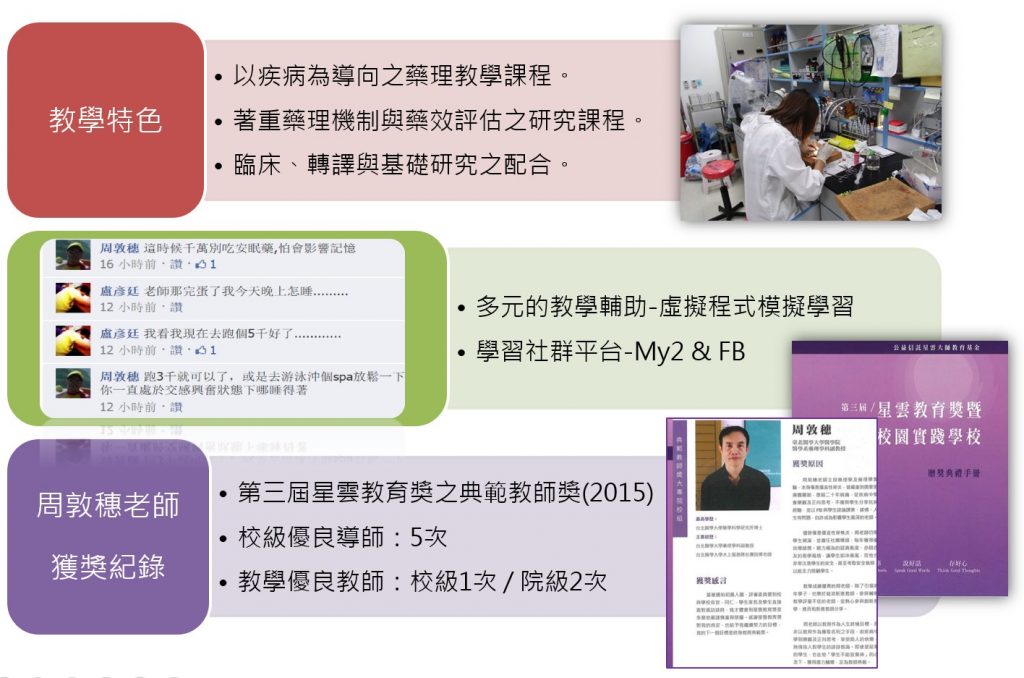Home
Our department was established in 2002, and our graduate students are supervised by professors from the department of medicine and pharmacology as well. Our main goal is to educate professional researchers in the field of pharmacology, and to promote mechanism studies in our school.
The orientation of our goal is contingent upon the main research goals of our university such as cardiovascular and thrombus studies, natural products in Chinese medicine, the development and study of functional mechanisms in synthetic medicine. In accordance with clinical and pharmacological studies we also strive to strengthen the application of such studies. Key Points of Middle and Long Term Research Plan:
(1) With the use of cloning and transfection genome-based biotechnology, we examine the different functions and effects of the target genetic polymorphism.
(2) Investigate vector transfection techniques, to better express or suppress specific genes in order to evaluate the effects of drug treatment on genes.



In accordance with clinical developments, our courses employ a heuristic mode of teaching and encourage students pose questions. Our courses guide our students step by step towards the theories and practical operation of pharmacology research. Our students are also required to take elective courses in order to enable them to develop an independent interest in research, so that they may be capable of problem solving. We also strive towards the education of pharmacology and to strengthen the cultivation of our faculty.
In order to cultivate professionals in pharmaceuticals, and to elevate the level of pharmacy development and mechanism exploration within our graduate students, the mandatory courses in our department are divided into the following 3 main sections: 1. Research Methods in Fundamental Pharmacology. 2. Laboratory practice in General Pharmacology Studies. 3. Research in Systemic Pharmacology.
The equipment in our department include those in pharmacology, physiology, molecular biology, cell culturing, etc. There are over 104 instruments.
Currently, the main areas of research within the faculty are the effects and mechanisms of medication on cardiovascular, hepatic, respiratory systems, cancer, and inflammation. The results of our research have been published in numerous journals. The future direction of our department is dependent upon the research orientation of our university, such areas include cardiovascular and thrombus studies, the development and effects of natural products in Chinese medicine or synthetic medicine. Further, in response to clinical and pharmacological studies, we also strive to improve the application of such studies.
The majority of our professors participate in external organizations such as the Taiwan Pharmacology Academic Society, Taiwan Medicine, and International Academic Societies of Physiology, Oncology, Radiology, Anesthesia, Internal Medicine, etc.
Graduates of our master’s program have the capacity of pursuing careers in the academia of pharmacology, teaching in medical organizations, clinical and related research careers. They are also able to apply for a doctorate program in the biomedical sciences. They also have the opportunity to engage in the development of life sciences, pharmaceutics production, and life science pharmacological technology.
We plan on broadening our collaboration with numerous research units in Taiwan, USA China, Japan and other countries. We hope that such interactions will include our students enrolled in the master’s program so that we may conduct student exchange programs. Currently, we have a short term exchange medical student from Austria who is in the field of cardiovascular inflammation studies, we also have international exchange visiting students from Spain and France.